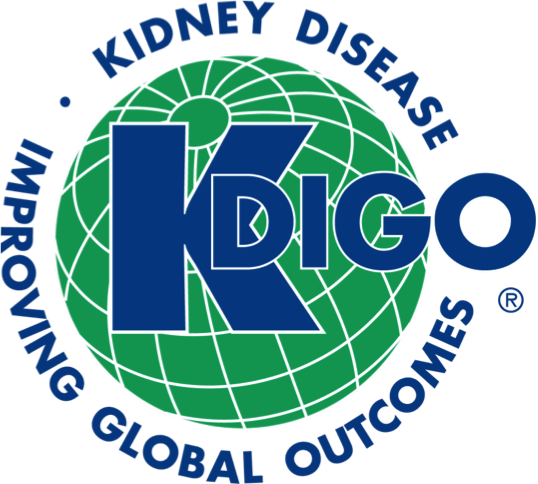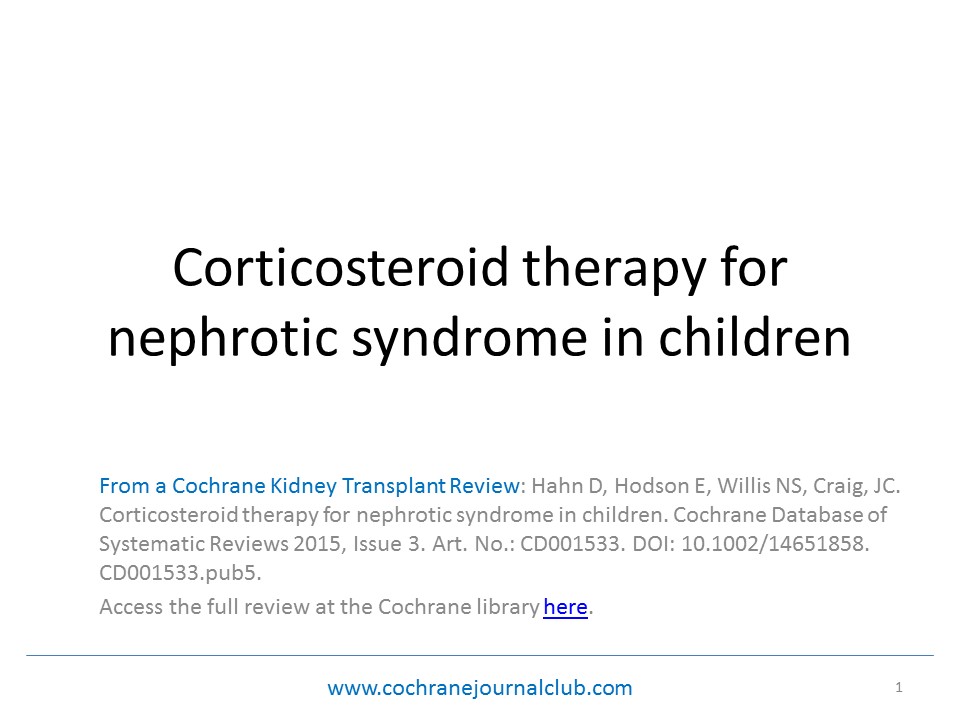![]()
The ISN presents a selection of images, articles and abstracts from Kidney International – Volume 14, Issue 1, February 2016 – from our editorial office in Japan.
 This webinar is part of a Webinar Series organised with KDIGO.
This webinar is part of a Webinar Series organised with KDIGO.
The webinar will discuss the soon to be released KDIGO Living Donor Guideline. More detailed information of this webinar will be available in August 2016.
 This webinar is part of a Webinar Series organised with KDIGO.
This webinar is part of a Webinar Series organised with KDIGO.
The webinar will discuss the role of the kidney in diabetes complications, help identify the main goals of management in patients with diabetes and CKD and present the current guidelines on how to treat diabetes complications in CKD patients.
This ISN webinar will bring be held in Chinese.
Thursday, 21 January 2016 13:35
Cochrane Library: Corticosteroids for nephrotic syndrome in children
Cochrane Library: Corticosteroids for nephrotic syndrome in children
Introduction
Introduction
Nephrotic syndrome is a chronic kidney condition that causes leakage of protein through the kidney to cause widespread tissue edema and increased thrombotic and infectious complications. Most children who develop the nephrotic syndrome experience prompt disease remission with corticosteroid therapy (prednisone or prednisolone) – although about 80% of children will experience one or more disease relapses and these relapses can continue into their adult life. Corticosteroid therapy is highly effective at inducing remission but has important negative implications for child health including slowed growth, obesity, impaired psychological well-being and longer term cardiovascular risk. The optimal dose and duration of corticosteroid therapy for children with nephrotic syndrome is uncertain because existing trials provide different results. In this Cochrane review from 2015, prednisone given for 2-3 months was as effective as longer term treatment (6 months) for preventing relapsing disease in children who have their first episode of nephrotic syndrome. Children with relapsing disease benefited from 5-7 days of daily prednisone therapy given at the time of an infection. The side effects of different treatment regimens are poorly understood.
Authors
 |
Deirdre Hahn Dee is a senior nephrologist based at The Children’s Hospital at Westmead in Sydney. The nephrology department at The Children’s Hospital is a major Australian center for children with kidney disorders including glomerulonephritis. |
 |
Elisabeth Hodson Elisabeth Hodson is Emeritus Consultant Physician in Paediatric Nephrology at the Children’s Hospital at Westmead in Sydney, Australia. She is an editor for Cochrane Kidney and Transplant and has written several Cochrane reviews. |
Copyright© 2016 Cochrane Kidney and Transplant. Published by John Wiley & Sons, Ltd.
Summary
Summary
This Cochrane Kidney and Transplant review from 2015 evaluates how corticosteroids treatment might be safely and most effectively used to treat steroid-sensitive nephrotic syndrome in children.
There have been three previous overviews of the evidence in 2000, 2005, and 2007 which showed that a longer duration of prednisone treatment up to seven months (3 to 7 months) better prevented disease relapse and helped children avoid frequent relapses after their first episode of nephrotic syndrome than shorter courses (2-3 months). Recently, new trials have contradicted this evidence by showing no benefit of prolonging prednisone treatment beyond 2-3 months.
To address this conflict in the existing information and to evaluate other treatment strategies, this is an updated evidence strategy combining earlier studies of corticosteroids with 10 newer trials to include 34 studies involving 3000 children.
Nephrotic syndrome is a chronic kidney condition that causes leakage of protein through the kidney to cause widespread tissue edema and increased thrombotic and infectious complications. Most children who develop the nephrotic syndrome experience prompt disease remission with corticosteroid therapy (prednisone or prednisolone) – although about 80% of children will experience one or more disease relapses and these relapses can continue into their adult life.
Although prednisone therapy has been used to treat nephrotic syndrome effectively for over 60 years, there is still no consensus about the optimal dose and duration of treatment to induce disease remission, prevent disease relapse, and minimize side-effects.
While prednisone is highly effective at switching off the disease processes that cause nephrotic syndrome in the kidney, corticosteroids are a non-targeted therapy that have side-effects that are particularly important for children – and especially for those children who need repeated courses of corticosteroid treatment. Major complications include impaired growth, weight gain, cataracts, and increased risks of heart disease in the long term. Behavioral and psychological changes are common even after only 12 weeks of therapy.
Existing evidence about the optimal dose and duration of corticosteroid therapy in children with nephrotic syndrome is conflicting. Previous Cochrane reviews including evidence to 2007 showed that longer courses of steroid treatment (3 to 7 months) months and higher doses better prevented disease relapse and helped children avoid subsequent relapses of disease after their first episode of nephrotic syndrome than shorter courses (2-3 months). However, this conclusion has been contradicted by three newer studies showing comparable prevention of frequently relapsing disease with shorter courses of corticosteroid treatment.
To address this uncertainty, this evidence update includes all available trials of corticosteroids for children with nephrotic syndrome and considers the reasons for the different conclusions among existing studies. The central source of trials in this review was the Cochrane Kidney and Transplant’s specialized register which houses more than 18 000 research reports. The register is the best curated source of trials in kidney disease which is drawn from citations in the Cochrane library, checking of journals and conference proceedings by hand, and automated searches of electronic bibliographies including MEDLINE.
This evidence summary adds ten new study publications to an existing Cochrane review from 2007 to include 34 trials and approximately 3000 children. Corticosteroid treatment was continued for between 8 and 24 weeks on average. Twenty-one studies evaluated prednisone treatment in children during their first episode of nephrotic syndrome and 13 studies assessed treatment in children with frequently relapsing disease.
When the quality of the evidence was considered, studies had generally few design limitations, especially those studies reported more recently, which offered moderately high confidence in the results, though earlier studies with longer duration therapies( 3-7 months) were at high risk or unclear in risk of bias assessment.
With inclusion of newer studies in the evidence summary, treatment with longer courses of prednisone (3 to 7 months) was still better than shorter treatment courses (2-3 months) for preventing subsequent disease relapses. However, the addition of the newer studies caused marked variation in the results from different studies (the studies gave statistically different results from each other, beyond variation that would be expected by chance). Exploring this variation can be informative to understand why existing studies draw different conclusions.
To learn more about which factors might be causing this variation, we divided studies into those studies which had important methodological limitations and those that had higher quality methods. We then noticed that prednisone treatment of the first episode of steroid-sensitive nephrotic syndrome for 2 to 3 months offered similar protection against disease relapse as much longer treatment course of several months in better quality trials that had transparent processes for randomly allocating children into treatment groups, masked caregivers and researchers from knowing which treatment was being used and ensured that most children were included in the study results. In the lower quality trials, which had important risks of bias because of the way that the study was carried out, longer term treatment of the initial nephrotic episode prevented disease relapse and recurrently relapsing disease better than short course treatment. We found no other explanations for the variability in the ways children responded to treatment including severity of disease or different ways of defining disease relapse.
When we examined treatment for children who already had frequently relapsing disease, daily prednisone started at the time a child had an infection and given for five to seven days prevented disease relapse better than continuing prednisone on alternate days or giving a placebo.
Across the studies, the possible harms of different approaches to prednisone treatment were not well reported, and sadly we don’t know whether specific treatment approaches can reduce the side-effects and longer term harmful consequences of disease. We particularly lack information about whether different durations of prednisone therapy might incur or avoid harm for children including growth, psychological well-being or quality of life.
The review authors conclude that children presenting with their first episode of nephrotic syndrome should be treated with two to three months of prednisone therapy. Short courses (5-7 days) of daily prednisone started at the time of an infection prevents relapse in children with relapsing disease.
In considering the questions that need to be addressed in future studies, the authors reflect on the relative lack of information for side effects in treatment. There is little information about the impact of different approaches to steroid treatment on child health in the longer term.
Copyright© 2016 Cochrane Kidney and Transplant. Published by John Wiley & Sons, Ltd.
Presentation
Presentation
Note: Audio not available
Copyright© 2016 Cochrane Kidney and Transplant. Published by John Wiley & Sons, Ltd.
Questions
Questions
1. What do you think of the findings of this Cochrane Review?
-
Do you believe that this review adequately summarizes the available data from studies of the treatment of steroid-sensitive nephrotic syndrome in children?
-
Are you aware of randomized controlled trials which have not been included in this systematic review and should be?
-
Do you agree with the authors’ assessment about which studies should be included or excluded from the review?
2. How might this review influence your clinical decisions about how to use corticosteroids in children with steroid-sensitive nephrotic syndrome?
-
Will the update of this review change the way that you manage children in their initial episode of steroid-sensitive nephrotic syndrome?
-
Will the update of this review change your management of children with frequently-relapsing nephrotic syndrome who relapse following intercurrent infections?
3. What other information would help you in managing children with steroid sensitive nephrotic syndrome?
-
Few studies assessed corticosteroids in relapsing SSNS. For example, there are no randomized controlled trials evaluating low dose prednisolone to reduce relapse? Do you think that such a study would be valuable? How would you design such a study?
-
Are there further studies of corticosteroids in relapsing steroid sensitive nephrotic syndrome that you would like to see?
-
Do you think that further randomized controlled trials are required to determine the duration of corticosteroids in the initial episode of steroid sensitive nephrotic syndrome?
-
If you believe that further trials are required, what comparisons of doses/duration of corticosteroids should be undertaken?
-
Studies rarely have follow up exceeding one year. Do you think that additional follow up could change the conclusions of future randomized trials?
-
Randomized trials provide limited information about adverse effects of corticosteroids. What study designs would you suggest to allow more useful data on adverse effects to be collected?
Copyright© 2016 Cochrane Kidney and Transplant. Published by John Wiley & Sons, Ltd.
Resources
Resources
Access other resources
- Hodson EM, Hahn D, Craig JC. Corticosteroids for the initial episode of steroid-sensitive nephrotic syndrome. Pediatric Nephrology July 2015, 30( 7) pg 1043- 1046 http://link.springer.com/article/10.1007/s00467-015-3106-6
- Hahn D, Hodson E. Corticosteroid therapy for Nephrotic Syndrome in Children. Cochrane Commentaries. Nephrology 2015, 20(10) pages 755-757 http://onlinelibrary.wiley.com/doi/10.1111/nep.12590/abstract
- Hahn D, Hodson E, Willis NS, Craig, JC. Corticosteroid therapy for nephrotic syndrome in children. Cochrane Database of Systematic Reviews 2015, Issue 3. Art. No.: CD001533. http://onlinelibrary.wiley.com/doi/10.1002/14651858.CD001533.pub5/abstract
Copyright© 2016 Cochrane Kidney and Transplant. Published by John Wiley & Sons, Ltd.
Ce webinar d’ISN va aborder le sujet de l’insuffisance rénale aiguë et sepsis. Les objectifs du webinar seront de (1) definir l’agression renale aigue et ses differents stades, (2) de reconnaitre l’AKI associé à un sepsis grave, (3) de determiner les elements du pronostic de l’AKI et du sepsis et de (4) steriliser le foyer infectieux et restaurer une fonction renale normale.
This ISN webinar will bring understanding around the nature of an emerging epidemic of unknown origin, the burden of disease in these conditions and will discuss potential pathophysiologic mechanisms.
This series of video presentations were presented during the 33rd Vicenza Course on Critical Care Nephrology held from June 9-12, 2015. They were given during the Opening Ceremony.
This series of video presentations were presented during the 33rd Vicenza Course on Critical Care Nephrology held from June 9-12, 2015. They were given during Session 10: New Horizons in AKI and CRRT.
This series of video presentations were presented during the 33rd Vicenza Course on Critical Care Nephrology held from June 9-12, 2015. They were given during Session 9: Critical Care Nephrology Issues.

